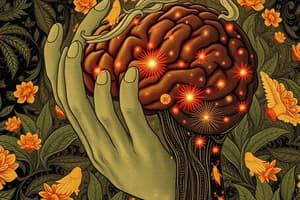Podcast
Questions and Answers
What does the primacy effect refer to in memory recall?
What does the primacy effect refer to in memory recall?
- Better recall of the first items in a list (correct)
- The inability to remember recent items
- Better recall of items from the middle of a list
- Improved retention of information through massed practice
Which model posits that sensory memory decays within seconds unless transferred to short-term memory?
Which model posits that sensory memory decays within seconds unless transferred to short-term memory?
- Levels of Processing Model
- Working Memory Model
- Atkinson-Schiffrin Model (correct)
- Cognitive Load Theory
In a long-term test scenario, which effect is most likely to be observed?
In a long-term test scenario, which effect is most likely to be observed?
- Recency effect is prominent
- Items presented last are equally remembered
- Items in the middle are best remembered
- Primacy effect is enhanced (correct)
What is the role of rehearsal in memory retention according to the findings on spaced and massed practice?
What is the role of rehearsal in memory retention according to the findings on spaced and massed practice?
What aspect of sensory memory was highlighted by George Sperling's research?
What aspect of sensory memory was highlighted by George Sperling's research?
According to the Baddeley-Hitch model, what component is responsible for the manipulation of information in working memory?
According to the Baddeley-Hitch model, what component is responsible for the manipulation of information in working memory?
Which of the following statements about short-term memory is false?
Which of the following statements about short-term memory is false?
What phenomenon occurs when individuals have better recall for the last items in a list immediately after presentation?
What phenomenon occurs when individuals have better recall for the last items in a list immediately after presentation?
Which type of memory typically involves recalling personal experiences and events?
Which type of memory typically involves recalling personal experiences and events?
What duration does echoic memory last compared to iconic memory?
What duration does echoic memory last compared to iconic memory?
Which type of memory is characterized by the ability to perform tasks without recalling the steps consciously?
Which type of memory is characterized by the ability to perform tasks without recalling the steps consciously?
Which memory process involves exposure to a stimulus that later influences behavior?
Which memory process involves exposure to a stimulus that later influences behavior?
Which of the following is a principle regarding the limited capacity of working memory?
Which of the following is a principle regarding the limited capacity of working memory?
Which component of Atkinson-Schiffrin's model is responsible for processing sensory information briefly?
Which component of Atkinson-Schiffrin's model is responsible for processing sensory information briefly?
What is the 'magic number' for the capacity of working memory as proposed by Miller?
What is the 'magic number' for the capacity of working memory as proposed by Miller?
What is the first step in the process of forming a memory?
What is the first step in the process of forming a memory?
In Baddeley and Hitch's model, which process allows information to bypass earlier memory stages?
In Baddeley and Hitch's model, which process allows information to bypass earlier memory stages?
Which of the following best describes retrieval in the context of memory?
Which of the following best describes retrieval in the context of memory?
What duration is typically associated with the working memory according to Peterson and Peterson's findings?
What duration is typically associated with the working memory according to Peterson and Peterson's findings?
Which statement accurately describes the effects of rehearsal on memory retention?
Which statement accurately describes the effects of rehearsal on memory retention?
Fill-in-the-blank tests are a measure of which type of memory retrieval?
Fill-in-the-blank tests are a measure of which type of memory retrieval?
What aspect of memory does the primacy effect refer to?
What aspect of memory does the primacy effect refer to?
Which memory task requires identifying an item from a list?
Which memory task requires identifying an item from a list?
In the context of memory, which of the following is NOT a retrieval cue?
In the context of memory, which of the following is NOT a retrieval cue?
Which component of Baddeley and Hitch's model is primarily involved in processing visual and spatial information?
Which component of Baddeley and Hitch's model is primarily involved in processing visual and spatial information?
Relearning measures the amount of which of the following?
Relearning measures the amount of which of the following?
What type of information is most beneficial for rehearsal in the context of memorization?
What type of information is most beneficial for rehearsal in the context of memorization?
What characterizes the primacy effect in memory?
What characterizes the primacy effect in memory?
Which of the following statements about the serial position effect is true?
Which of the following statements about the serial position effect is true?
Which memory model emphasizes the stages of encoding, storage, and retrieval?
Which memory model emphasizes the stages of encoding, storage, and retrieval?
What is the recency effect in memory retrieval?
What is the recency effect in memory retrieval?
What role does rehearsal play in memory?
What role does rehearsal play in memory?
What does the process of priming involve in memory retrieval?
What does the process of priming involve in memory retrieval?
Which factor does NOT contribute to the ease of memory retrieval according to the discussed theories?
Which factor does NOT contribute to the ease of memory retrieval according to the discussed theories?
According to the parallel distributed-processing theory, how is information organized in the brain?
According to the parallel distributed-processing theory, how is information organized in the brain?
What does the term 'Déjà Vu' imply in the context of memory?
What does the term 'Déjà Vu' imply in the context of memory?
How does rehearsal affect memory retention according to the content?
How does rehearsal affect memory retention according to the content?
What are retrieval cues primarily influenced by?
What are retrieval cues primarily influenced by?
Which of the following best characterizes the findings from Godden and Baddeley’s study?
Which of the following best characterizes the findings from Godden and Baddeley’s study?
What is a major challenge of the Atkinson-Schiffrin Model in understanding memory?
What is a major challenge of the Atkinson-Schiffrin Model in understanding memory?
Which statement best describes the effects of the primacy and recency effects in memory?
Which statement best describes the effects of the primacy and recency effects in memory?
Which aspect is least associated with Baddeley-Hitch Model of memory?
Which aspect is least associated with Baddeley-Hitch Model of memory?
Flashcards
Ebbinghaus's Rehearsal Principle
Ebbinghaus's Rehearsal Principle
Distributed practice leads to better information retention than massed practice.
Serial Position Effect
Serial Position Effect
In a list, people tend to remember first and last items best, and middle items worse.
Primacy Effect
Primacy Effect
Remembering the first items in a list better than the middle items.
Recency Effect
Recency Effect
Signup and view all the flashcards
Sensory Memory (visual)
Sensory Memory (visual)
Signup and view all the flashcards
Sensory Memory (auditory)
Sensory Memory (auditory)
Signup and view all the flashcards
Sperling's Experiment
Sperling's Experiment
Signup and view all the flashcards
Short-term vs. long-term memory test
Short-term vs. long-term memory test
Signup and view all the flashcards
Memory Loss over Time
Memory Loss over Time
Signup and view all the flashcards
Sensory Memory Duration
Sensory Memory Duration
Signup and view all the flashcards
Short-Term Memory Characteristics
Short-Term Memory Characteristics
Signup and view all the flashcards
What is Declarative Memory?
What is Declarative Memory?
Signup and view all the flashcards
What is Procedural Memory?
What is Procedural Memory?
Signup and view all the flashcards
Encoding
Encoding
Signup and view all the flashcards
Storage
Storage
Signup and view all the flashcards
Retrieval
Retrieval
Signup and view all the flashcards
Retrieval Cues
Retrieval Cues
Signup and view all the flashcards
Recall
Recall
Signup and view all the flashcards
Fill-in-the-blank test
Fill-in-the-blank test
Signup and view all the flashcards
Recognition
Recognition
Signup and view all the flashcards
Multiple-choice test
Multiple-choice test
Signup and view all the flashcards
Relearning
Relearning
Signup and view all the flashcards
Relearning time savings
Relearning time savings
Signup and view all the flashcards
Three-stage model of memory
Three-stage model of memory
Signup and view all the flashcards
Working memory
Working memory
Signup and view all the flashcards
Sensory memory
Sensory memory
Signup and view all the flashcards
Short-term memory duration
Short-term memory duration
Signup and view all the flashcards
Long-term memory
Long-term memory
Signup and view all the flashcards
Atkinson-Shiffrin model
Atkinson-Shiffrin model
Signup and view all the flashcards
Baddeley & Hitch Model
Baddeley & Hitch Model
Signup and view all the flashcards
Working Memory Capacity (Miller, 1956)
Working Memory Capacity (Miller, 1956)
Signup and view all the flashcards
Rehearsal effects
Rehearsal effects
Signup and view all the flashcards
Relearning on Day 2
Relearning on Day 2
Signup and view all the flashcards
Original Trials
Original Trials
Signup and view all the flashcards
Savings
Savings
Signup and view all the flashcards
Parallel Distributed Processing (PDP)
Parallel Distributed Processing (PDP)
Signup and view all the flashcards
Priming
Priming
Signup and view all the flashcards
Déjà vu
Déjà vu
Signup and view all the flashcards
Mood-congruent Memory
Mood-congruent Memory
Signup and view all the flashcards
Associations
Associations
Signup and view all the flashcards
How are memories stored?
How are memories stored?
Signup and view all the flashcards
Study Notes
Chapter 8 - Memory
- False memories often appear more real than true memories, similar to how a flawed jewel might appear more brilliant than a genuine one.
Chapter Outline
- How Memory Functions
- Spatial Memory
- Problems with Memory
- Memory and the Brain
- Ways to Enhance Memory
The Phenomenon of Memory
- Memory is the ability to store and retrieve information over time.
- Memory forms the basis of knowledge about oneself, others, language, and the world.
Memory
- Without memory, individuals would perceive everyone and everything as unfamiliar.
The Perfect Memory
- Patient S's conversations led to a recall of past memories.
- S experienced recall of jumbled past memories while on tour.
Flashbulb Memory
- Flashbulb memories are highly emotional, clear, and persistent memories of significant events.
- These memories, while vivid, are not always completely accurate.
- Examples of flashbulb memories include 9/11, the assassination of J.F. Kennedy, and the OJ Simpson verdict.
How Memory Functions: Encoding
- Memory processes are: Encoding, Storage, Retrieval
- Encoding involves creating a representation in memory
- There are two types of encoding: Effortful & Automatic.
Encoding
- Memory is enhanced when information is organized into a hierarchical structure.
- Meaning (semantic encoding), imagery (visual encoding), organization (chunks, hierarchies) are key components of encoding.
Types of Encoding
- Semantic (meaning-based), acoustic, visual encoding are distinct ways information is encoded.
Imagery
- Different examples of items used during the imagery section.
Organization
- Example of organizing items into organized chunks.
Organization - Chunks
- Examples of grouping items together
- XNBCPHDSATCBSX
Organization - Hierarchies
- Memory is best retained when organized into a hierarchical format
What is Memory Storage?
- Atkinson-Schiffrin Model
- Includes sensory memory, short-term memory, and long-term memory.
Modifications to the Three-Stage Model
- Baddeley & Hitch Model
- Some information bypasses the initial stages and directly enters long-term memory
- Important information is actively processed into working memory
- Working memory is a critical aspect of information processing.
Working Memory
- A contemporary understanding of short-term memory that includes active processing of information.
Duration of Working Memory
- The duration of working memory is approximately 20 seconds
Hermann Ebbinghaus
- Importance of rehearsal on memory.
- Memorizing nonsense words, such as DAX, BUP, and LOD, demonstrated memory effects.
Retention Curve
- More time spent studying on Day 1 results in less time needed to relearn on a later day.
Spacing Effect
- Information is better retained when the repetition is spaced over time.
The Serial Position Effect
- Remembering the first and last items on a list is easier than remembering items in the middle.
Short-term vs Long-term Test
- First and last items are easier to remember when tested short term
- Only first items are easier to remember when tested long term
Memory Storage
- Sensory Memory
- Short-term Memory
- Long-term Memory
- Retrieval methods
Sensory Memory
- Fleeting sensory information (sights, smells, sounds).
- Short duration to decide if information is important or not (a few seconds).
Echoic Memory
- Momentary retention of auditory information.
Iconic Memory
- Visual sensory memory.
- Brief retention of visual information.
Partial Report
- The capacity of sensory memory is larger than originally thought.
Time Delay
- Sensory memory loss increases with longer delay from initial exposure.
Short-Term Memory
- Short duration and limited capacity
- Random digits are easier to recall than random letters
Retaining Information: Short Term Memory
- Limited duration and capacity of short-term memory.
- Recall is easier for random digits compared to random letters.
How Memory Functions: Long-term memory
- Declarative (explicit), Implicit(nondeclarative).
Declarative Memory
- Semantic (facts and general knowledge)
- Episodic (personal experiences and events)
Implicit Memory
- Procedural (motor skills and habits)
- Classical Conditioning (conditioned responses)
Priming
- Recall of specific memories depends on activation of associated concepts or cues.
Context Effects
- Memory is influenced by the environment in which it is learned or recalled.
- Same contexts used for learning and retrieval lead to higher recall.
Déjà Vu
- Feeling of familiarity with a current situation.
- Triggered by cues associated with past experiences
Moods Memories
- Experiences are often recalled in line with one's current mood.
- Specific emotions serve as retrieval cues
State-Dependent Memory and Mood Congruency
- Mental or physical state serves as a retrieval cue for memories.
- Mood congruency: retrieval of memories consistent with current mood
Measures of Memory: Recall
- Information retrieval is required, such as in fill-in-the-blank tests
Measures of Memory: Recognition
- Identifying information is needed, such as in multiple choice tests
Relearning
- Measures the time saved when retrieving information for a second time
Retrieval Cues
- Web of associations aids in memory retrieval.
- Cues (smells, sounds, sights) aid memory retrieval.
Associations and Priming
- Memory is interconnected as a web of associations.
- Priming activates associated elements (e.g., seeing "rabbit" activates memory associated with the word).
Studying That Suits You
Use AI to generate personalized quizzes and flashcards to suit your learning preferences.




